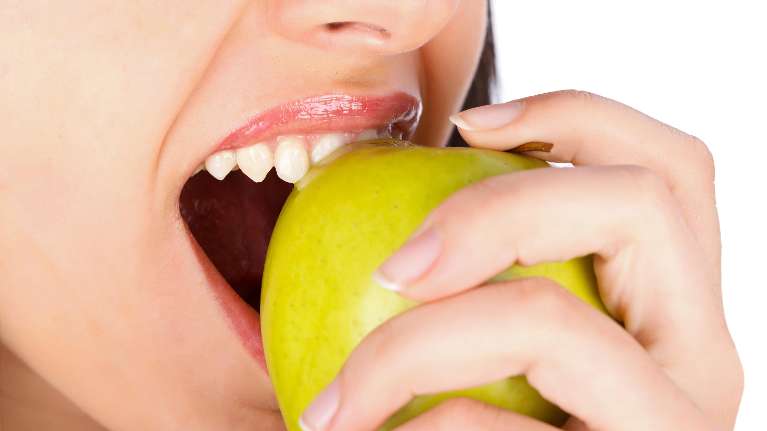
The phrase "An apple a day keeps the dentist away" is a popular notion, but the relationship between apples and dental health is more complex, involving both significant benefits and potential risks.
The Dental Benefits of Apples:
Apples offer several advantages that support oral health:
-
Saliva Production (Nature's Rinse): The crispness of an apple requires vigorous chewing, which stimulates a significant flow of saliva. Saliva is your mouth’s primary natural defense mechanism, working to:
-
Wash away food particles and harmful bacteria.
-
Neutralize the acidic {pH} level in your mouth, protecting enamel from damage.
-
-
Mechanical Scrubbing Action: The fibrous texture, especially in the apple's skin, can act as a mild, natural scrub. This abrasive quality may help remove loose food debris from the surface of your teeth and gently massage the gums. (However, this is not a substitute for brushing and flossing.)
-
Nutrient Support: Apples contain essential nutrients like Vitamin C, which is vital for maintaining the health and resilience of your gums and connective tissues.
The Potential Drawbacks (Acid and Sugar):
While beneficial, apples are not entirely benign for teeth due to their intrinsic chemical composition:
Best Practices for Apple Consumption
-
Acidity and Erosion: Apples contain natural acids, such as malic acid. The {pH} level of an apple is typically in the acidic range (around $3.3 to $3.9). Consuming acidic foods temporarily softens the outer layer of your tooth enamel, making it vulnerable to dental erosion—an irreversible loss of tooth structure. Sour varieties, like Granny Smith apples, tend to be more acidic and thus carry a greater risk.
-
Natural Sugars and Decay: Apples contain fermentable carbohydrates (natural sugars). Oral bacteria feed on these sugars and produce acids that also lead to tooth decay and cavities.
To enjoy the health benefits of apples while minimizing the dental risks, experts recommend these guidelines:
| Best Practice | Dental Rationale |
|---|---|
| Rinse with Water |
Swishing water immediately after eating helps wash away residual sugar and neutralize lingering acid.
|
| Wait to Brush |
Brushing immediately after consuming acidic foods can cause the toothbrush to scrub the acid into the softened enamel. Wait at least 30 minutes before brushing to allow your saliva to naturally remineralize and harden the enamel.
|
| Combine with Meals |
Eating apples as part of a meal (especially paired with acid-neutralizing foods like cheese or nuts) helps buffer the acid. Avoid eating them as standalone, frequent snacks throughout the day.
|
| Slice the Apple |
For those with sensitive teeth or concerns about direct impact, slicing the apple before eating reduces direct, concentrated exposure on the front teeth.
|
In conclusion, apples are a healthy food that can support your dental health through saliva stimulation and fibrous texture. However, they are not a replacement for a proper oral hygiene routine. They should be consumed mindfully, considering their acid and sugar content.
